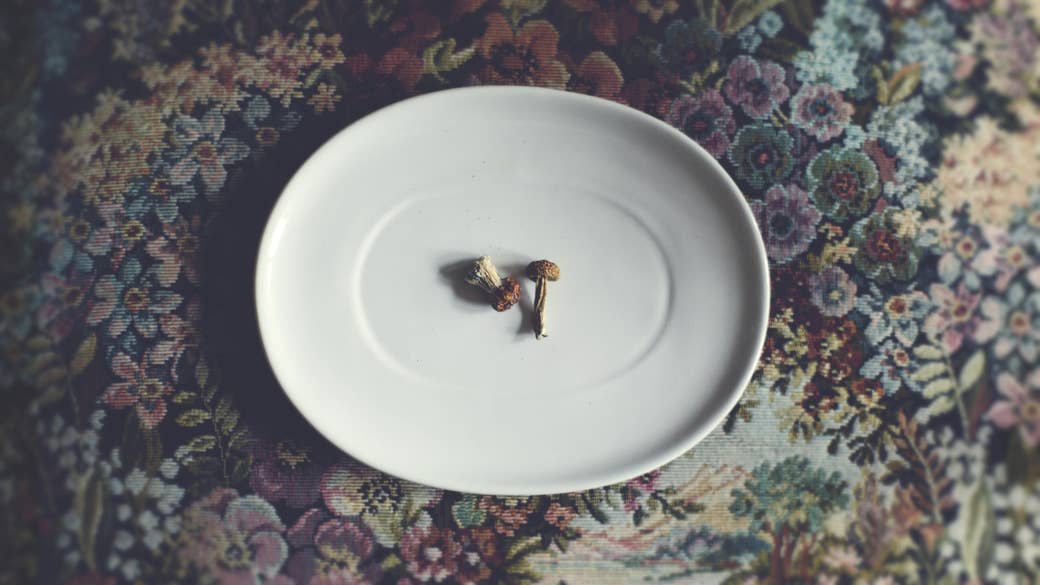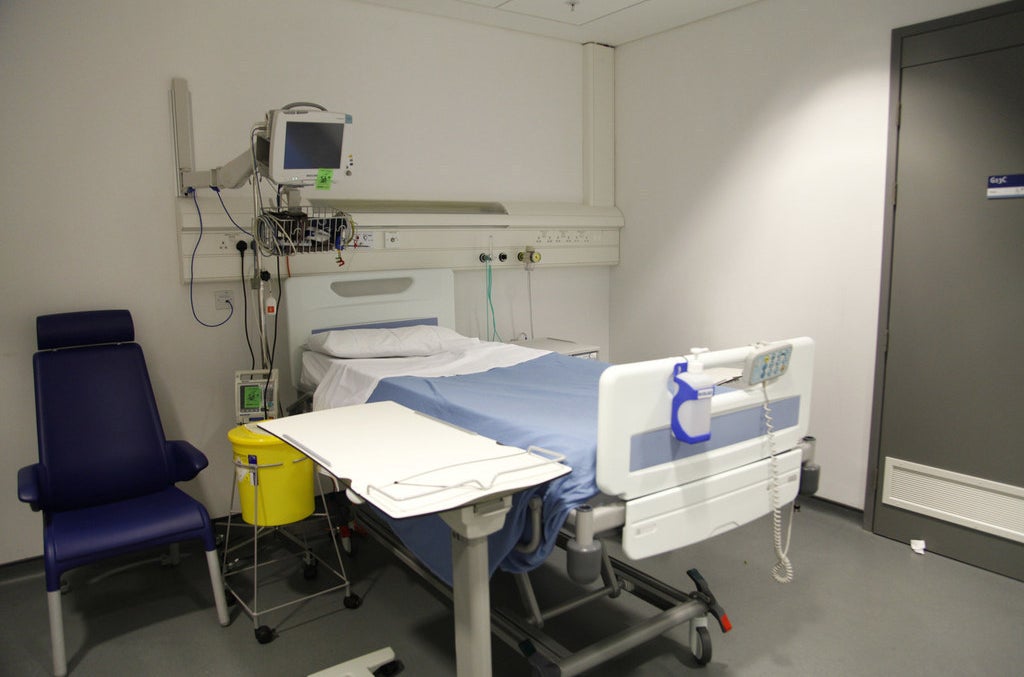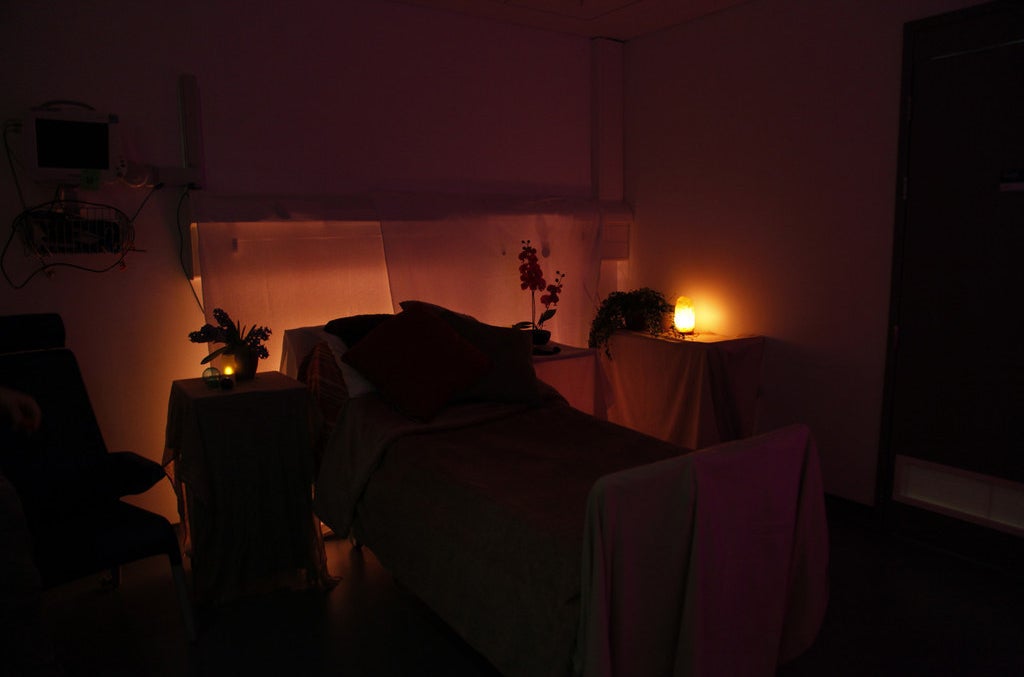
Three years after Ian Roullier finally faced down the father who abused him and saw him sent to jail, he confronted him again, in the shape of a terrifying armoured horse.
This wasn't a nightmare. Roullier was not only awake, he was high on magic mushrooms in a hospital room. He and eleven other patients with long-standing depression were treated with the illegal drug psilocybin (the active ingredient in magic mushrooms) at Imperial College London, part of a trial that saw psychedelic drugs used as medicines for the first time in the UK in nearly 50 years.
It's a small study, with no control group, but the scientists running the study believe this could, eventually, become a treatment for depression. Today's results have been called “promising but not compelling” by other scientists, who say more research is needed to determine whether the effect is real, and sticks over time.
Roullier has had depression for much of his adult life, but four years ago he began a downward spiral that he couldn't pull out of. Both he and his sister were abused by their father as children, and in 2012 they at last faced him in court and saw him jailed. Though it was the end of one struggle for justice, the stress of the court case pushed Roullier over the edge.
“I tried to carry on," he said, "plough through everything and keep working as hard as I could, even though the longer I ignored it the more depressed, angry, and full of despair I became."
He kept reducing his workload in the hope that he could shake off his depression, but ended up having to quit work in 2014. Antidepressants made it worse; talking therapies didn't help.
Then, while searching the internet for other treatments, he found a talk by scientist Robin Carhart-Harris about how psychedelic drugs might be useful to treat depression. Roullier got in touch and, just over a year later, joined the trial.
The data has just been published in the Lancet Psychiatry medical journal, and it shows that most of the patients felt significant relief from their depression for a number of weeks after the experience, and five of the 12 were still free from depression three months later (Roullier is not among them). It’s impossible to say at this point whether the effects can be distinguished from the placebo effect – where participants can get better when taking a dummy treatment and being told it’s the real thing – or whether the apparent relief from depression will last over the long term. But the results are intriguing.
What the raw data doesn't show, though, are the intense and often terrifying journeys that many of the subjects went on in the sessions.
"I think you could do as much harm as you could do good.”
It is a treatment that even the researchers themselves admit can be extremely risky if not handled in the right way, as Carhart-Harris said: “It's a very frightening thing to say perhaps – and it speaks to the power of psychedelics – but I think you could do as much harm as you could do good.”
The criteria for being accepted on to the Imperial trial was to have “treatment-resistant” depression, so these are, by definition, people who are in a vulnerable state, who haven't been helped by antidepressants or talking therapies. Many of the participants have been living with depression for decades, and one of the conditions for the trial was that they would come off their medication, to avoid it contaminating the results.
This is the first trial using psychedelics to treat depression in the modern era, and part of a worldwide resurgence in psychedelic science. The first wave came to an end in the '60s and '70s as the drugs were made illegal. Until then psychedelics were a major research topic for psychotherapy, and were used as a treatment for everything from alcoholism to schizophrenia. Between 1950 and 1965, around 40,000 patients underwent some kind of psychedelic therapy, and it produced over a thousand scientific papers.
The number of scientific papers being produced during this "psychedelic renaissance" is a relative trickle, but already since the first paper was published in 2006 there have been promising results from small trials in the United States looking at psychedelic treatments for post-traumatic stress disorder, end-of-life anxiety, and alcoholism.
That 2006 paper was based on a landmark trial at the Johns Hopkins hospital in Baltimore. Since then the team behind it has run some of the most pioneering trials with psilocybin and LSD. Many of their studies talk about psychedelics producing a “mystical” or “spiritual” experience – the strength of which is closely linked to any healing process that comes from the drug, whether that is related to lessening anxiety for those with terminal cancer, or giving up drinking for alcoholics.
"It felt like I was stuck in a loop, and this broke the loop."
For some on the Imperial depression study this seems to be true. One participant, who did not want to be named, also had depression for over 20 years, to the point where he says he simply couldn't imagine going on. He said the experience of the psychedelic session was “transformative, like a fog lifted and my confidence came back”.
He is one of the five patients still in remission (depression-free) three months after the study: “There simply aren't words to describe the experience. I can say that it felt like the usual self-narration we all have daily vanished completely. I used to ruminate and think, 'What's the point of anything?' Now I've had an experience of being connected to everything, it felt like I was stuck in a loop and this broke the loop.”
Carhart-Harris said that “breaking the loop” is one of the effects psychedelics have on the brain, and it's why he was so keen to test them on depression.
Three years ago, he ran an experiment giving psilocybin to healthy volunteers and scanning their brains to measure the effects. The scans showed a decrease in a key area called the default mode network. “It's a region that's overactive in depression," he said. "It's responsible for that heavy introspection and rumination you can get chewing over problems – chewing over how terrible you are and worthless, for example. And it's about sort of quieting that heavy negative critical self-reflection and introspection.”
This explains why the drug might give relief from symptoms while people are under the influence, but Roullier and several others report feeling better, if not all entirely depression-free, several months after the drug session. While not ruling out a direct drug effect on the brain, all the subjects and researchers say that what seems to have the lasting impact is the meaning that subjects take from the experience itself and the deep inner journey that many of them describe.
The researchers emphasise how the trial was not just about giving people psychedelic drugs in the hope they felt better, but about supporting and guiding people carefully through the experience of a psychedelic trip.
Since the '60s, the phrase "set and setting" has become part of psychedelic drug folklore, in other words that the setting – the environment that the drug is taken in – and the set, the state of mind of the participant, are crucial to the outcome of the psychedelic experience.
So the team at Imperial did their best to curate the "setting" for their participants, turning a bare hospital room into a comfortable and warm space with the use of careful lighting, drapes, and music. Three people were present with the subject to help support them in the experience, usually including Carhart-Harris and at least one trained psychologist.


The "set", on the other hand, was bound to be difficult, as these were all patients with long histories of mental distress. And for some of them this journey was not only mystical, transcendental, or blissful, it was also terrifying. So it was for Roullier, when he had his dark and frightening encounter with the father who had abused him.
Ros Watts is a clinical psychologist who helped guide people through the experience: “Often with psychedelics, emotions and difficult experiences that have been repressed because they're so uncomfortable and painful come to the surface. That can be very healthy and very positive in terms of change, because avoidance of difficult emotion is really at the heart of many mental health difficulties. Accepting those emotions, letting them in, and experiencing can allow people to process them and kind of put them to rest.”
Watts, Carhart-Harris, and the other therapists were guided in turn by one of the father figures of psychedelic therapy, Bill Richards. He was part of many of the original scientific trials back in the '60s. Having sat in on thousands of psychedelic sessions, he has some simple guidelines for making the most of the experience.
“We prepare people to welcome whatever they may encounter – no picking and choosing," he said. "Sometimes you have to go through the dark night to get to the top of the mountain and the sunrise. If the inner dragon or monster appears, look him in the eye – go straight towards him. If you look the monster in the eye and go towards it, ask it what it wants – there's always resolution, transformation, and new knowledge. When you run from it, you get into panic and paranoia, like a typical nightmare – and then you say, 'I've had a bad trip.'”
"I ended up laughing hysterically, and the experience went from dark to blissful."
Roullier said this advice helped him when he encountered his father during his trip: “I could see my dad – this sounds ridiculous – as a terrifying military horse,” he said. “I looked it dead in the eye and went through it. I ended up laughing hysterically and the experience went from dark to blissful. It was only by facing my darkest fears I was able to get into that state of calm. If I had fought against them I think I would have been stuck for hours.”
Even the scientists running the trial are being very cautious about their conclusions. “This is not a message that people with depression should go out and do psychedelics,” Carhart-Harris said. “These are unpredictable and potentially dangerous drugs.”
Outside scientists also urged caution. Philip Cowen, a professor of psychopharmacology at Oxford, who was not involved with the Imperial study, said that the results were "promising but not compelling" as about half the group showed improvement, and the other half were still meeting the criteria for depression. He said more detailed follow-ups were needed: "There are dangers with these self-reported outcomes – the placebo effect can be strong. We need to talk to their families and friends, to get more accurate information to see if they agree that the effect has been maintained over several months."
Jonathan Flint, a professor of neuroscience at Oxford, who was also not involved in the trial, echoed the worry that there's no way to determine whether the effect seen in the study is caused by placebo, or anything else the scientists did, and that it's impossible to say whether it was down to the drug itself. He told the Science Media Centre: "There is nothing in this paper to indicate that it might cure depression."
For psychedelics to become a legal treatment for depression in the UK, let alone on the NHS, is some way off. A series of scientific trials have to take place first – of which this is just the first – each one more expensive than the last. And this is a drug that will never make serious money for any big pharmaceutical company, because it cannot be patented. The researchers at Imperial are doing cutting-edge science, but on a shoestring budget, staffed mainly with volunteers.
Carhart-Harris is optimistic and says he has had meetings with wealthy individuals and companies who might fund future trials, partly for ideological reasons and partly because they could set up private psychedelic therapy centres in the future. However, he believes that if it is shown to work, the therapy needs to be available to all, not just those who can afford it: "I have absolutely no doubt that this should roll out and become an available treatment for depression. I think it needs to. We have an ethical obligation. I feel that – granted, we need to do more research – but I really feel this that this should be available for people."
"My whole attitude towards my depression is that it's better to be open."
Six months on from his session Roullier is not free of depression, but he is managing to volunteer a couple of days a week, and says he has a different perspective on his condition: "It's not that negativity stopped arising, but that I realised I needed to approach all feelings with acceptance. With depression you wake up and push away all bad feelings and thoughts, and the more you push them away the bigger they become.
"My whole attitude towards my depression is that it's better to be open; there's too much stigma around depression, and especially around psychedelics."
